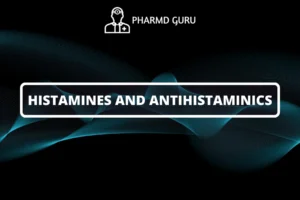High blood pressure, or hypertension, is a common cardiovascular condition that significantly increases the risk of heart disease, stroke, and other health complications. Antihypertensive drugs play a crucial role in managing and controlling blood pressure levels. In this article, we will explore the pharmacology of antihypertensive drugs, their mechanisms of action, different classes of drugs, and considerations in their usage.
SCROLL DOWN TO THE BOTTOM OF THIS PAGE FOR ACTUAL NOTES.
TABLE OF CONTENTS:
- Introduction
- Mechanism of Action
- Classes of Antihypertensive Drugs
- Diuretics
- Beta Blockers
- Angiotensin-Converting Enzyme (ACE) Inhibitors
- Angiotensin II Receptor Blockers (ARBs)
- Calcium Channel Blockers
- Alpha Blockers
- Central Alpha Agonists
- Direct Vasodilators
- Considerations in Usage
Introduction
Antihypertensive drugs are medications used to lower and control high blood pressure. They work by targeting different mechanisms in the body to reduce blood pressure and decrease the strain on the cardiovascular system.
Mechanism of Action
Different classes of antihypertensive drugs exert their effects through various mechanisms:
Diuretics
Diuretics promote the excretion of excess sodium and water from the body through increased urine production. By reducing fluid volume, diuretics help decrease blood pressure.
Beta Blockers
Beta blockers block the action of adrenaline (epinephrine) and noradrenaline (norepinephrine) on beta-adrenergic receptors, leading to decreased heart rate and cardiac output. This reduces the workload on the heart and lowers blood pressure.
Angiotensin-Converting Enzyme (ACE) Inhibitors
ACE inhibitors inhibit the activity of angiotensin-converting enzyme, an enzyme involved in the production of angiotensin II. By blocking this enzyme, ACE inhibitors prevent the constriction of blood vessels and lower blood pressure.
Angiotensin II Receptor Blockers (ARBs)
ARBs block the action of angiotensin II, a potent vasoconstrictor, by binding to its receptors. This results in vasodilation and reduced blood pressure.
Calcium Channel Blockers
Calcium channel blockers prevent the entry of calcium into the smooth muscle cells of blood vessels and the heart. This relaxation of blood vessels and reduced contractility of the heart lead to lowered blood pressure.
Alpha Blockers
Alpha blockers inhibit the action of alpha-adrenergic receptors, promoting the dilation of blood vessels and reducing resistance to blood flow. This helps lower blood pressure.
Central Alpha Agonists
Central alpha agonists work in the central nervous system to reduce sympathetic nerve activity, resulting in decreased peripheral vascular resistance and blood pressure.
Direct Vasodilators
Direct vasodilators relax the smooth muscle in blood vessel walls, leading to vasodilation and reduced blood pressure.
Classes of Antihypertensive Drugs
The following classes of antihypertensive drugs are commonly prescribed:
- Diuretics: Thiazide diuretics, Loop diuretics, Potassium-sparing diuretics
- Beta Blockers: Atenolol, Metoprolol, Propranolol
- Angiotensin-Converting Enzyme (ACE) Inhibitors: Lisinopril, Enalapril, Ramipril
- Angiotensin II Receptor Blockers (ARBs): Losartan, Valsartan, Olmesartan
- Calcium Channel Blockers: Amlodipine, Nifedipine, Diltiazem
- Alpha Blockers: Doxazosin, Prazosin, Terazosin
- Central Alpha Agonists: Clonidine, Methyldopa
- Direct Vasodilators: Hydralazine, Minoxidil
Each class of antihypertensive drugs has its own unique mechanism of action and considerations in usage. Healthcare professionals determine the most suitable medication based on the individual’s health profile and response to treatment.
Considerations in Usage
When prescribing and using antihypertensive drugs, certain considerations should be taken into account:
- Individualized Treatment: Treatment plans should be tailored to the individual’s specific needs, considering factors such as age, overall health, coexisting conditions, and potential drug interactions.
- Monitoring: Regular monitoring of blood pressure and potential side effects is crucial to assess the effectiveness of treatment and make necessary adjustments.
- Adherence to Medication: Consistent and appropriate use of antihypertensive medications is vital for long-term blood pressure control and reducing the risk of cardiovascular complications.
- Lifestyle Modifications: Antihypertensive drugs are often prescribed in conjunction with lifestyle changes, such as adopting a healthy diet, regular exercise, weight management, and stress reduction techniques.
ACTUAL NOTES:




